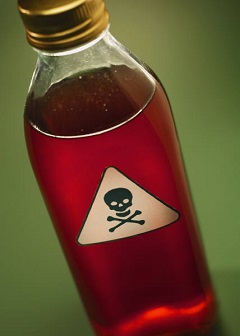Household Hazards
Most people think of their home as a safe haven, but that's not true when it comes to poisons. Of the two million poison exposures that are reported every year in the United States, roughly 90 percent occur in the home. These involve not only poisons that are swallowed, but also skin and eye contact with toxic substances.
The most common agents in home poisonings include cleaning products, medications, cosmetics and personal care products, pesticides, vitamins, arts and crafts supplies, chemicals, and alcohol.
Poisoning prevention begins with common sense. Keep all potential poisons in their original containers with their labels intact. Read and carefully follow the label instructions on every potentially poisonous product (for example, some products require that you wear protective clothing or eye protection when using them).
Store household products or toxic substances far away from food, and never store potential poisons in used food containers. (Storing turpentine in an old apple juice jug, for example, is an invitation for disaster). Carefully dispose of outdated products you don't anticipate using again. Toxic substances should not be discarded with your regular household garbage. Instead, contact the Los Angeles County Department of Public Works Hotline at 1-888-CLEAN-LA(253-2652) for information on the disposal of hazardous waste.
Young children have the greatest risk for accidental poisoning because they're naturally curious and will put much of what they can reach into their mouths. Again, simple, common sense precautions can prevent accidents. Store potential poisons out of sight and out of reach of children, including kids who may be visiting your home. Household detergent and other cleaning products should be stored in cabinets above the level of the kitchen counter top, not under the sink. To protect older children who may be able to reach these higher storage locations, all cabinets containing poisons should be secured with a lock or safety latch.
Medications pose a special hazard for children. Doses considered routine in adults may be life-threatening in children. Medications should always be stored in child-resistant containers, which are much more difficult for small children to open. Be aware, however, that "child-resistant" doesn't mean childproof, so all medications should be kept in locked cabinets. (Most bathroom medicine cabinets are easily accessible, even to young children).
Use similar precautions with nonprescription drugs. Some over-the-counter products-aspirin, for example-can be lethal in children if large amounts are consumed. Even nutritional supplements can be toxic when taken in excessive amounts. Every year, several children die of iron poisoning after consuming large amounts of vitamins left out by parents who did not appreciate the danger.
Accidental drug poisonings in children frequently involve medications belonging to someone other than a child's immediate family member. If you have young children in your home, ask your house guests not to leave their medications on counters or in purses or bags that children can reach.
When visiting other people's homes with your young children, don't let them roam around until you have checked the surroundings and are sure they're safe. Grandparents’ homes are no exception. Because of their age, they're more likely to take medications and less likely to use child-resistant containers which may be difficult for them to open.
Links
Air Cleaning Devices
- Air Cleaning Devices for the Home- Frequently Asked Questions - California EPA Air Resources Board
- Ozone Generators that are Sold as Air Cleaners - U.S. Environmental Protection Agency
Hazardous Waste
- www.888cleanla.com - Los Angeles County Department of Public Works
Household Chemicals
- Cleaning Products and Indoor Air Quality Fact Sheet - California EPA Air Resources Board
- Certified Clean Air Solvents - South Coast Air Quality Management District
- Household Products - U.S. National Library of Medicine and National Institutes of Health
- National Institutes of Health
Poisonings
- California Poison Control System - 1-800-222-1222
- American Association of Poison Control Centers
- MedlinePlus for Poisonings - U.S. National Library of Medicine and National Institutes of Health
Unused, Unwanted and Expired Medications
- Household Hazardous and Electronic Waste Program - Los Angeles County Sanitation Districts
- No Drugs Down the Drain Program - Los Angeles County Sanitation Districts





